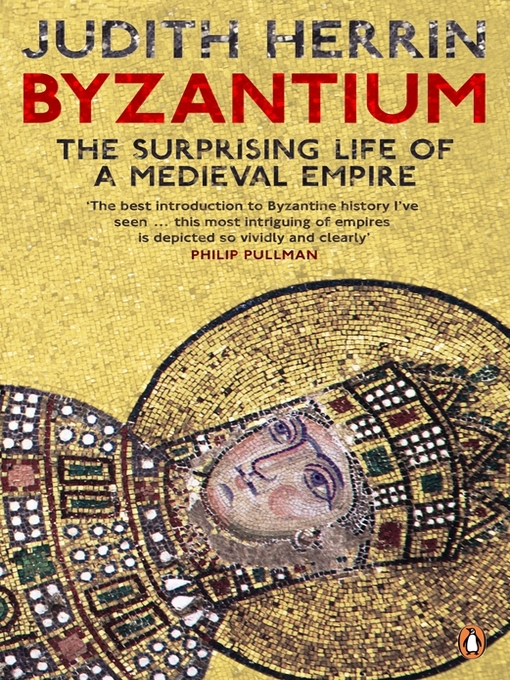What I really wanted to know was how Byzantine people lived. What I got was massive generalizations about education, and social mobility skewed towards Judith Herrin's (as she admits) own attempts to reframe our view of Byzantine success.
What I wanted to know was the sort of mentality that controlled the palacial rulers. What I got were hints of court intrigues and an avalanche of names.
I really wanted a chapter on the female emporers, because it's quite incredible that a Christian empire surrounded by equally fanatic Abrahamic nations was ruled for periods by women. They got mentioned, and Judith Herrin clearly has a lot of respect for them, but like the rest of the book the focus was unstable. (edit: Judith Herrin has written a book about the female rulers of Byzantium. It's called Women In Purple.)
Anyway, enough of the moaning. What was good?
Loads.
Let's start with the most quoted extract ever written about Byzantium. Judith Herrin uses it as an explanation for why Byzantine history has been bad-mouthed and forgotten. Personally, I don't buy that, because if this is the sort of reaction that Byzantine history stokes in people, then I'd be wanting to know more.
"Of that Byzantine empire, the universal verdict of history is that in consitutues, without a single exception, the most thoroughly base and despicable form that civilization has yet assumed. There has been no other enduring civilization so absolutely destitute of all forms and elements of greatness, and none to which the epithet 'mean' may be so empthatically applied... The history of the empire is a monotonous story of the intrigues of priests, eunuchs, and women, of poisonings, of conspiracies, of uniform ingratitude."Byzantine history is surely all of these things. But then, so is Roman and Greek history... and that of the royal families of Europe, and Asia... in fact, the aristocracy have almost always behaved abysmally. So, this doesn't explain why so much of Byzantine history has been lost.
Or has it been lost? Has it been covered up?
The answer to both those questions is 'yes'. The fall of Byzantium is an embarrassment to Christiandom, since it was at the hands of Crusaders under encouragement and blessings from the Pope and the Doge who sacked Constantinople and started it's fall from power. These were the crusaders who were going to fight the Arabs and seize back Jerusalem. Except, they sacked Constantinople and didn't make it any further, preferring to occupy the city.
How can you justify that? You can't really, can you. Even more embarrassing is that 50 years later the Byzantine emporer managed to seize the city back, even though it was too late and too weakened to ever recover.
So what do you do? Label them heretics, barbarians, base creatures. Steal everything worthwhile and paint the rest black.
The Byzantines considered themselves Romans as well, right through to the end, and it's this same question that Judith Herrin is trying to answer about them: What did the Byzantines ever do for us?
Aside from some spectacular diplomacy and negotiation skills that managed to keep the Muslim advance out of Europe, they gave us the template for our modern law books, kept much of Greek philosophy alive, and greatly informed Mediterranean and Islamic art.
There's so much stress in this book on the Byzantines' acceptance of social mobility that the entire point of the book is bent around the idea. Education was a primary element of Byzantine culture (though she glosses over the issue of the working masses tending to be educated in religion), in fact, secular education was relatively common, with law, Greek philosophy and mathemetics being the most common subjects. Reading was paramount. And this education permitted a degree of social mobility that just didn't exist in many other medieval cultures.
The education and beaurocracy of the empire was so strong that when the crusaders sacked Constantinople, the individual cities, towns and states were able to carry on for another 200 odd years in the same vein without any central empirical leadership.
The three examples that are always given to exemplify the Byzantine's openness to social mobility are the emporers Basil II, Zoe, and Theodora. An Armenian slave and two women.
As popular history this book spends far too long on the petty squabbles of Western and Eastern Christianity (if only I had a pound for every time the argument about levened or unlevened bread was mentioned), and not enough time on the mob. This was a culture where the mob actually ruled. The emporers stayed empiric by pleasing the mob. There were grand games, and side-shows, everything the emporer did in public was propganda in spectacular proportions. Entertainment was so important to the masses that they accepted Emporer Justinian marrying a circus girl (Theodora).
A bit less about the artistic styles and petty Christian disputes and a bit more about the daily life of the standard person and this would have been a magnificent introduction to Byzantine history.


No comments:
Post a Comment